Nothing thrills me more than attending the NY Film Festival. I used to hitchhike from Provincetown, Mass. in the 1970s and sleep on the couch of the late, great Cookie Mueller (ironically featured on the Nan Goldin poster for this year’s festival). Each day I would head uptown to Lincoln Center and gorge myself on movies. I think the only year I missed the festival (besides during Covid) was when I was having surgery on a broken leg and even then I yearned to crawl on my hands and knees for my fall season movie fix. This year has an extraordinary line-up from favorite directors and new discoveries, and even a restoration of The Mother and the Whore, a movie that really represents the kind of cinematic daring I come to expect from this glorious festival. Here are some of the highlights of films I’ve seen so far.
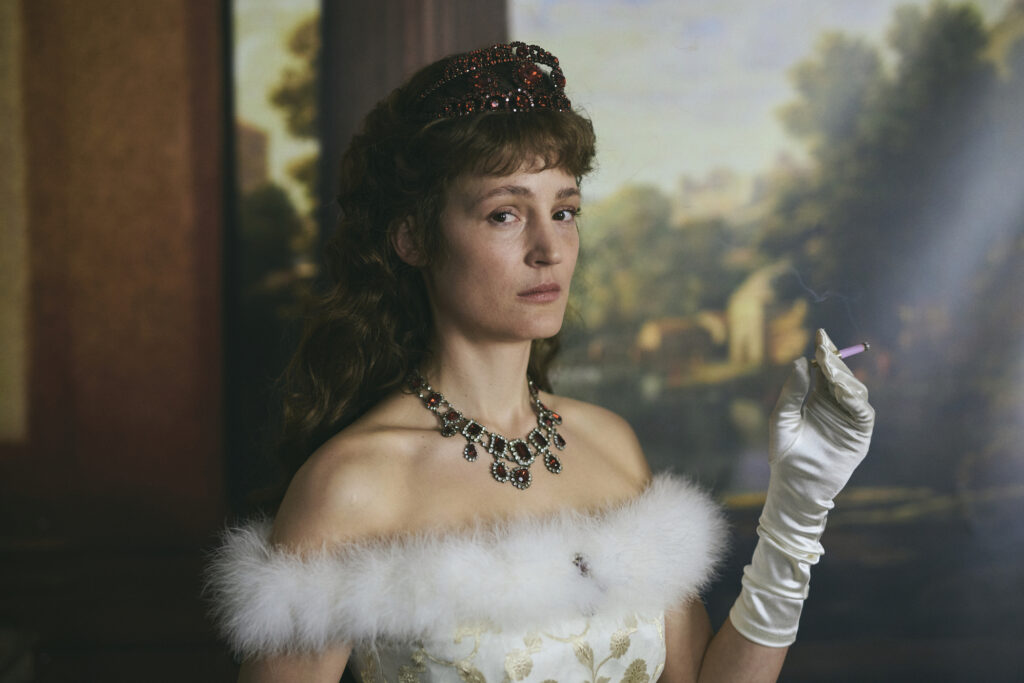
Corsage. Vicky Krieps is just astonishing in director Marie Kreutzer’s fabulous, fictional account of Empress Elisabeth of Austria. Restless and weary of her Court duties in 1877, Elisabeth often pretends to faint at functions just to get out of them, or lights up a cigarette at a royal dinner and flounces out of the room giving everyone the middle finger. Turning 40, she has to endure public scrutiny about her weight and her fading beauty. Her real joy is riding her horse, smoking, fencing or visiting a female mental ward handing out candy violets- because in many ways she shares their confinement and misery. Her young daughter is embarrassed by her behavior and her older son, who is obviously fond of his mother, is more worried of how her actions impact his father the Emperor. The director’s wily use of anachronisms- like someone at the harp singing “As Tears Go By” feels apt in this bird in a gilded cage construct. But it’s to Krieps’ credit that she makes this apocryphal Elisabeth coming thrillingly alive. When she is scolded “You abandon yourself to every whim without considering your position,” you feel her frustration and anger. It’s hard not to think of Princess Diana watching this compelling and devastating film about a woman burning to just be herself in a world where she cannot.
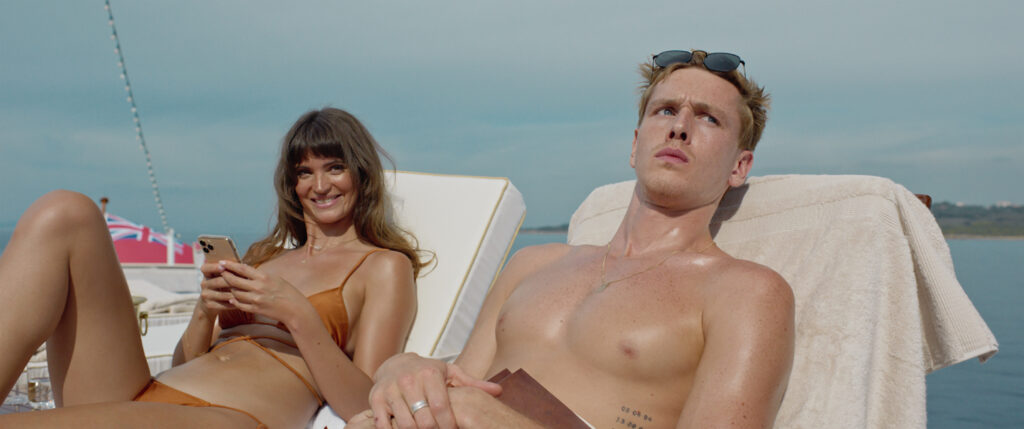
Triangle of Sadness. Ruben Ostlund’s (Force Majeure) latest is a sardonically funny take on the dynamics of power- in relationships and in society. It begins with a couple- Carl (Harris Dickinson), a handsome male model, and Yaya (Cahribi Dean), a gorgeous model and influencer, squabbling over the payment of the check at a restaurant. Then it escalates aboard a yacht (a trip they have scored for free), when Yaya’s harmless “hello” to a shirtless crewman causes Carl to complain and gets the man fired. The boat is filled with all sorts of parodies of wealth and power- including a garrulous Russian (Zlatko Buric) who has made his millions from “shit” (fertilizer), and a sprightly, elderly British couple who’ve made money maufacturing land mines and explosives. The Russian’s wife (Sunnyi Melles) demands that the crew all take a swim with her, crying out “we are all equal!” and they all have to comply, causing the Captain’s dinner to be pushed back later during an incredible stormy night. After that things turn grotesquely Monty Python-like wrong. Woody Harrelson is hilarious as the drunken, Marxist Captain getting in a long, liquored harangue with the Russian over the loudspeakers of the boat as people are retching into their toilets. It ends up on an island where the toilet lady of the boat- Abigail (Dolly De Leon) flips the dynamics of power, and because she can fish and cook and start a fire, Abigail becomes the alpha of the group of survivors. It’s a wild ride. It’s also shooting fish in a barrel too, but that didn’t make The Discreet Charm of the Bourgeoisie any less delicious either.

Decision to Leave. South Korean director Park Chan-wook (Oldboy) first film since 2016’s The Handmaiden is a noirish tale of murder and obsession. An insomniac, married detective Hae-joon (Park Hae-il) falls under the spell of the beautiful Chinese immigrant wife Seo-rae (Tang Wei) he is investigating in the death of her husband during a mountain climbing accident. At first suspicious of the woman because of the cool way she receives the news of his death and hospital reports that show she been systematically physically abused by her husband. But her alibi is airtight and another conclusion is reached about his death. Hae-joon continues obsessing and stalking her as she does him. Disgusted with his own behavior during the investigation he moves to another town where his wife works and another husband murder brings him back face-to-face with Seo-rae and the fatal attraction returns, with disastrous results. Considering my love for this director, I wanted to love the movie but is seemed overlong and muddled for me, although the two leads are quite glorious.
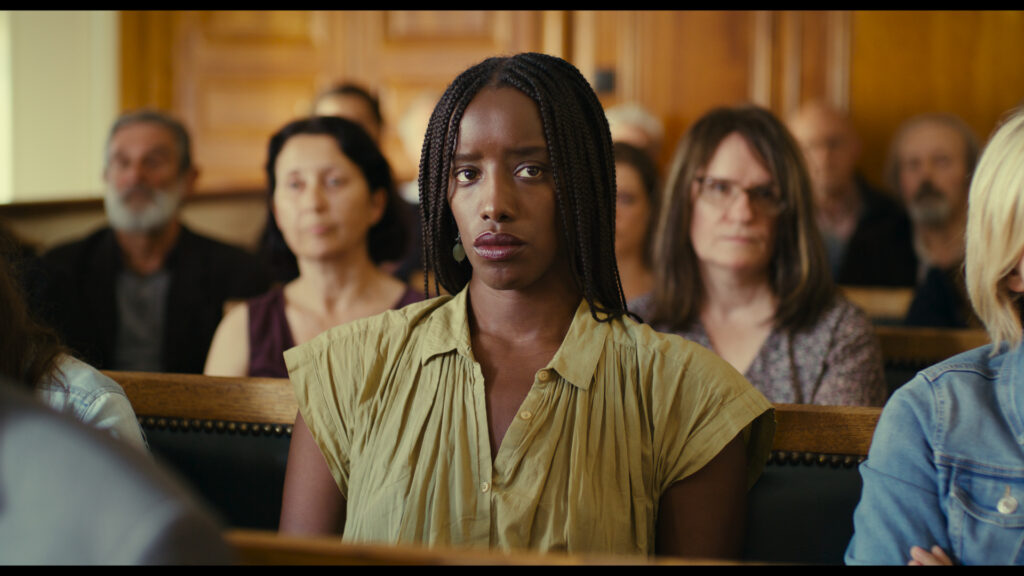
Saint Omer. Quietly devastating film by Alice Diop about Rama (stunning Kayije Kagame), a writer and professor attending the trial of Laurence Coly (Guslagie Malanga), a Franco-Senegalese graduate student, who murdered her 15-month-old baby on a beach in France. Laurence is enigmatic and reserved in the courtroom. She admits she doesn’t understand why she killed her child, and her descriptions of isolation and fear and secrecy (even in the birth of the child) paint a portrait of loneliness and desperation. Rama watches the proceedings with a sense of dread. She is 4 months pregnant herself and is fearful she will repeat the cold, deeply troubled relationship she has with her own mother (seen in flashbacks where the two barely can look each other in the eye). But Diop’s coverage of the trial is what makes the film stand out. It is simple and near-documentary like, and it has a hypnotic effect of the viewer. There are moments that mesmerize- like a connecting look between Rama and Laurence in the courtroom; Rama watching scenes from Pasolini’s Medea starring Maria Callas on her computer and a haunting Nina Simone song later in the film. But the attorney for the defense’s impassioned speech at the end of the trial is the most gut-wrenching and heartbreaking sequence in this remarkable, unforgettable film.
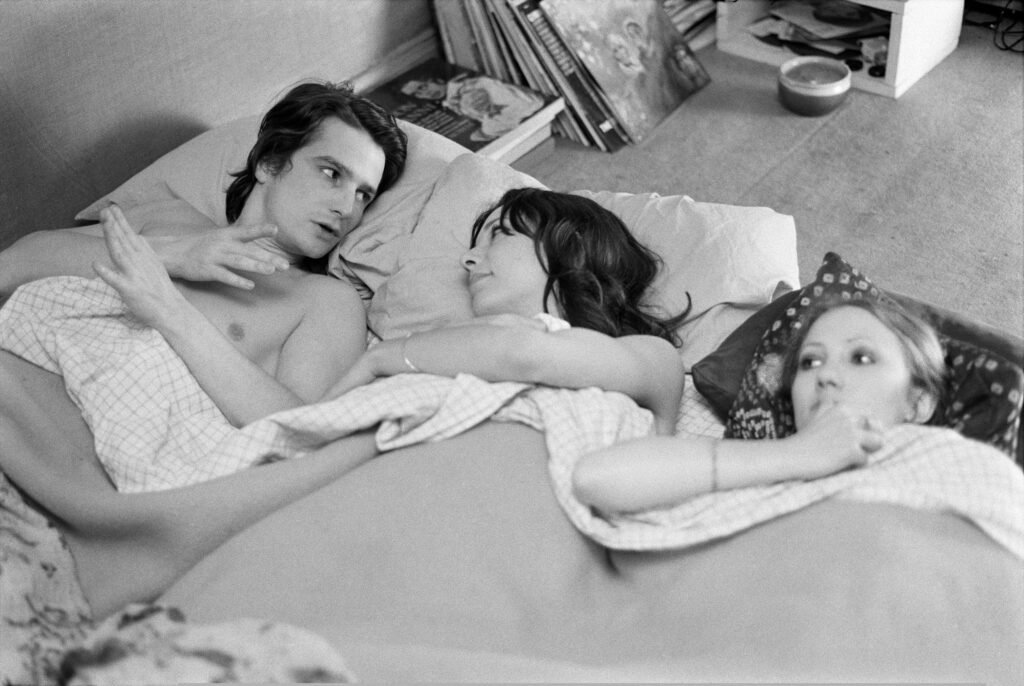
The Mother and the Whore. Jean Eusatche’s 1973 French masterpiece is about the rootless, disaffected youth of 70s Paris. Starring Francois Truffaut’s cinematic alter-ego Jean-Pierre Leaud as Alexandre, living and sleeping with Marie (Bernadette Lafont), who works in a dress shop. Alexandre doesn’t do much of anything. He’s impulsive, opinionated, full-of-himself, strutting down the street nattily dressed with his knotted, long silk scarf. He spends his days in cafes, chain-smoking and talking with friends when he isn’t picking up girls. He asks his sculptor friend, “What are you doing tomorrow?” and the friend replies, “Nothing, of course.” His new conquest is Veronika (Francoise Lebrun), an anesthesiologist at a hospital who is more sexually liberated, free-wheeling and mercurial than flings he is accustomed to. Veronika shows up drunk at 4 in the morning and climbs into bed with Alexandre and Marie. “Your romances are starting to piss me off,” Marie admits. Typically, when Marie admits to seeing another man, Alexandre loses it. Coming in at a punishing 3 hours and 27 minutes, there’s endless smoking, drinking, talking, fucking and listening to records. In one astonishing sequence, Marie listens to the entire Edith Piaf song- Les Amants de Paris. But it all has a cumulative, hypnotic power to it. At the end when Veronika unleashes a Joycean stream-of-consciousness rant about sex, it is cinema at its most personal, provocative and thrilling.
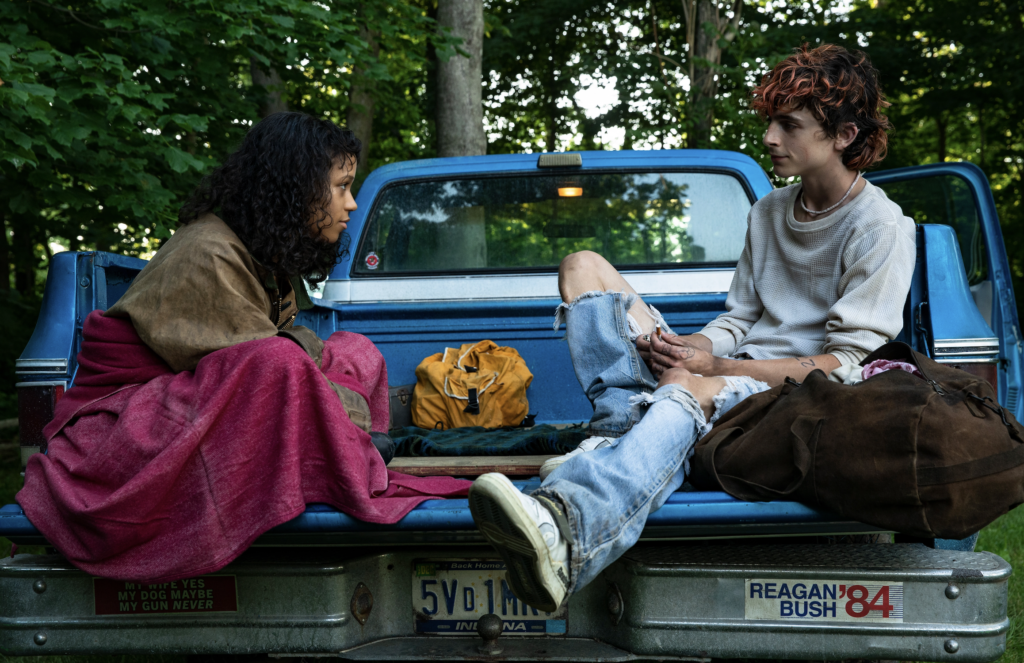
Bones and All. Surprisingly romantic young “cannibals in love” movie from Luca Guadagnini (Call Me by Your Name). Based on a novel by Camille DeAngelis, it stars the charismatic Taylor Russell as Maren, whose father has deserted her because of her “affliction” of cannibalism, which she had been able to keep under control until recently. She is heading along the highways by bus and during a stopover she meets a creepy, older man- Sully (Mark Rylance), who instructs her that people of “their” kind can smell each other out. She gets majorly weirded out by him and hops another bus out of town. (Rylance hilariously chews the scenery and when he utters “Nothing dully with Sully,” you just die). Down the road, she sniffs out another of her kind- Lee (Timothee Chalamet) and they tentatively bond and head down the road in a stolen truck together. Chalamet is perfect young wet dream material- scruffy, with hennaed hair and incredibly ripped jeans, he the kind of damaged soul that is irresistible and he accompanies Maren on her mission to reconnect with the mother she never knew. This kind of loony romanticism mixed with blood is usually found in vampire films like Kathryn Bigelow’s Near Dark or Jim Jarmusch’s Only Lovers Left Alive. But there is real tenderness and crackpot poetry to these bloodthirsty lovers’ journey. Never has the phrase “eat me” seemed more like a kiss.

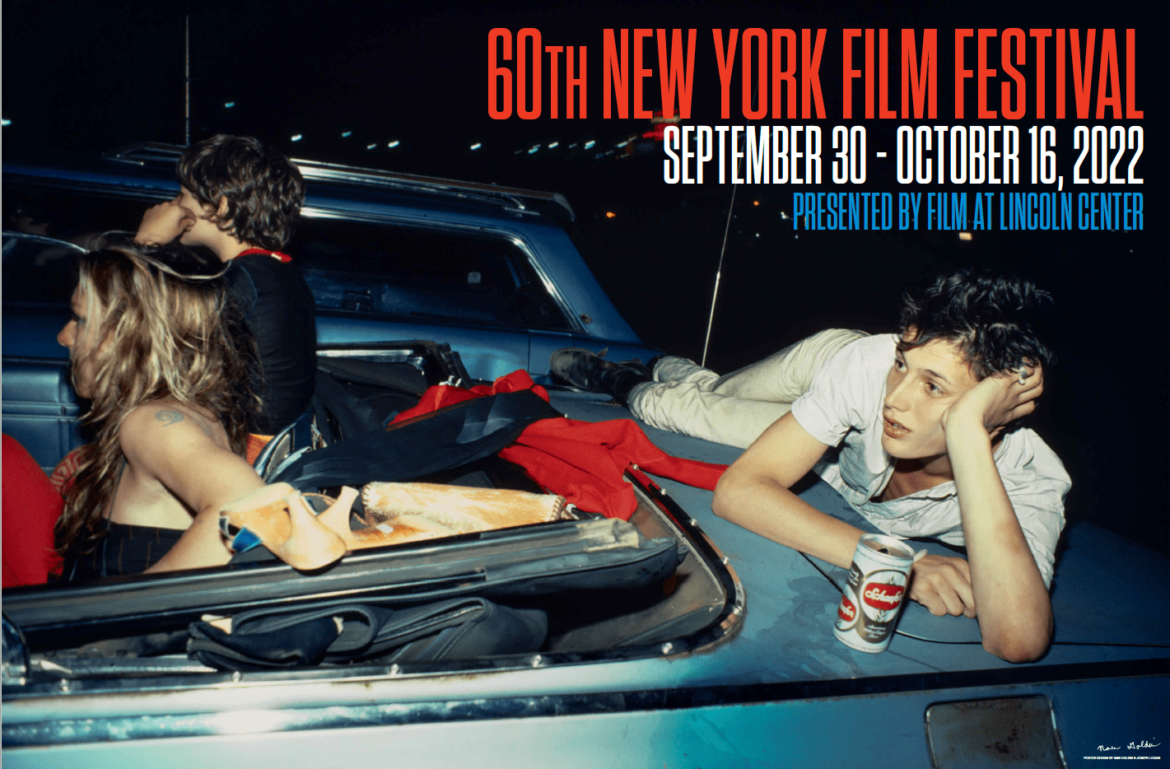
Hi Dennis, what is the name of the boy on the back of Cookie’s car? I use to hang with him and drink apricot sours at the Poyant Bakery.xoxo
French Chris- he lived around the corner from me here in NY- he was a doll…I asked Sharon about him and he went back to France and no one ever heard from him again…
You are a treasure, Mr. Dermody. Loved reading about these strange movies. Excellent writing.
Sister Mary Flavian